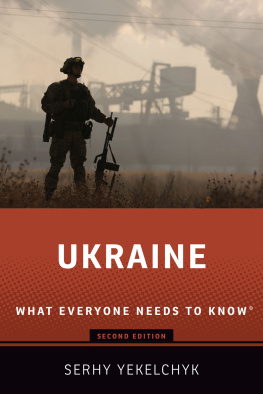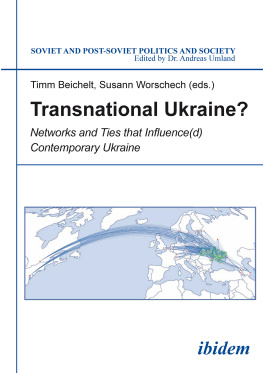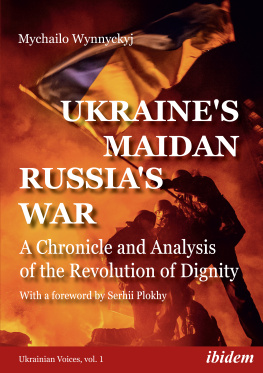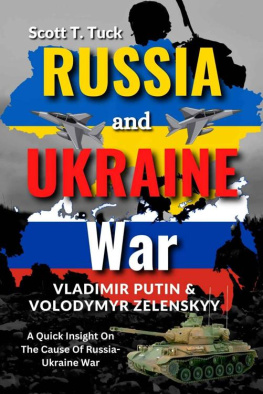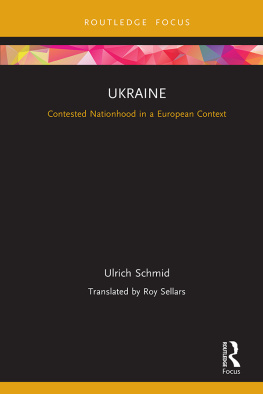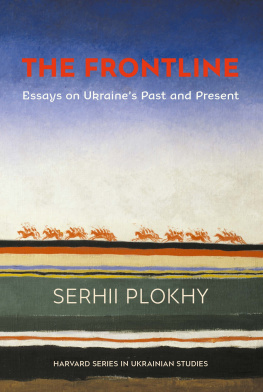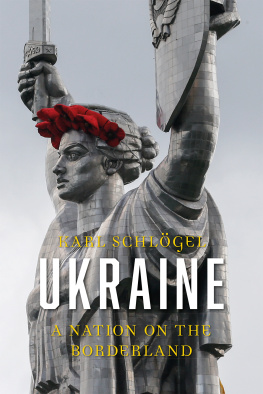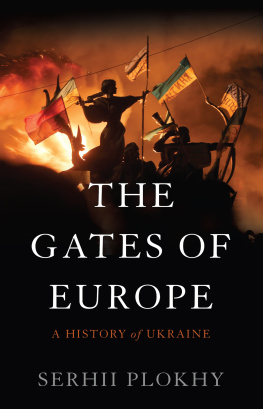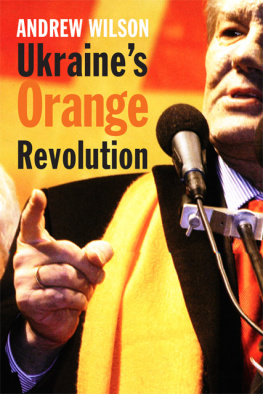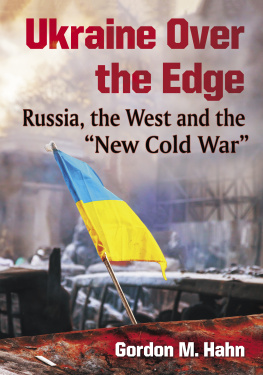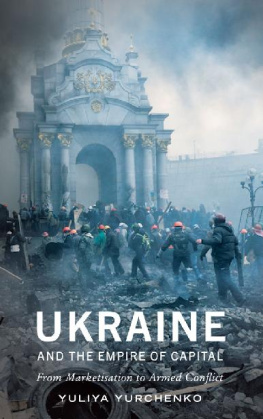UKRAINE
WHAT EVERYONE NEEDS TO KNOW

Oxford University Press is a department of the University of Oxford. It furthers the Universitys objective of excellence in research, scholarship, and education by publishing worldwide. Oxford is a registered trade mark of Oxford University Press in the UK and certain other countries.
What Everyone Needs to Know is a registered trademark of
Oxford University Press.
Published in the United States of America by Oxford University Press 198 Madison Avenue, New York, NY 10016, United States of America.
Oxford University Press 2015, 2020
All rights reserved. No part of this publication may be reproduced, stored in a retrieval system, or transmitted, in any form or by any means, without the prior permission in writing of Oxford University Press, or as expressly permitted by law, by license, or under terms agreed with the appropriate reproduction rights organization. Inquiries concerning reproduction outside the scope of the above should be sent to the Rights Department, Oxford University Press, at the address above.
You must not circulate this work in any other form and you must impose this same condition on any acquirer.
Library of Congress Control Number: 2020940800
ISBN 9780197532119 (pbk.)
ISBN 9780197532102 (hbk.)
ISBN 9780197532133 (epub.)
To the memory of
Anna I. Yeremina
Contents
I wrote the text of what became this books first edition during a difficult year for Ukraine, when war seemed to rip the country apart. Both Ukrainian citizens and international specialists on Ukraine found themselves engaged in emotional arguments about peoples power, political legitimacy, nationalism, and foreign involvement. Above all, they struggled to make sense of the war suddenly exploding in the heart of Eastern Europe decades after the collapse of communism, when the region should have been well on its way to prosperity and democracy. As I was writing this book, I was both worried and hopeful. I was concerned about family members and friends in Ukraine, who often held opposite views on the conflict but suffered from its consequences in much the same way. At the same time, I was hoping to see an end to the death and dislocation that the war had brought, and to catch a glimpse of a peaceful and democratic Ukraine emerging from the conflict.
That difficult year included four trips to Ukraine, and I must start by thanking my hosts there: the Lviv Center for Urban History of East-Central Europe, Laurus Publishers, and my family in Kyiv. I am also deeply grateful to the following institutions that invited me to deliver lectures about the conflict in Ukraine, thereby helping to formulate this books main arguments: Agnes Scott College, Canadian Institute of Ukrainian Studies, Canadian International Council (Victoria Branch), Center for Urban History of East-Central Europe, University of Alberta, University of Ottawa, University of Toronto, and University of Tbingen. At my home institution, the University of Victoria, I gave talks on Ukraine twice in the Faculty of Continuing Studies and once in connection with the History Departments series World Affairs in Historical Perspective. I wish to thank my colleagues who invited me to these forums and provided valuable commentary: Dominique Arel, Greg Blue, Elizabeth Bowman, Alan Breakspear, Penny Briden, Martin Bunton, Sofia Dyak, Mayhill C. Fowler, Madina Goldberg, Oleh Ilnytzkyj, Bohdan Klid, Volodymyr Kravchenko, Thomas Lahusen, Janet McDonald, Iryna Matsevko, Don Nightingale, Natalia Pylypiuk, and Schamma Schahadat. In addition, Derek Fraser and Michael Moser kindly shared with me some of their formidable diplomatic and linguistic expertise, respectively.
Special thanks are owed to two online periodicals that are run by academics but are aimed at a wider audience of policymakers and the general public: Origins: Current Events in Historical Perspective at Ohio State University and Perspectives on Europe, a publication of the Council on Foreign Relations. Both published my articles on the conflict in Ukraine, and the process of writing and revising them did much to clarify my thinking on this issue. I greatly appreciate the time and effort that Nicholas Breyfogle of Origins and Neringa Klumbyt of Perspectives took to help improve my texts and the invitation to contribute in the first place.
The many media interviews and texts that I wrote for a general audience since the crisis began helped greatly in honing the ideas in this book. Some of these media contacts provided inspiration as much as an opportunity to formulate my thoughtsin particular, a surprise invitation from Lisa M. Bonos to write an op-ed for the Washington Post and the dozens of telephone interviews with Terry Moore of C-FAX radio in Victoria, who joked about having my number on speed dial. Over the years, Stuart Williams of the AFP and Peter ONeil of Postmedia asked a number of penetrating questions about Ukraine, and Pierre Heumann of Die Weltwoche published my longest-ever interview in a Western weekly. In Ukraine, I am grateful above all to Tetiana Teren for the lengthy, thought-provoking interview for Ukrainska Pravda and Ostap Drozdov for an inspiring conversation on his television show Direct Quote on ZIK channel.
Stephen Ejack, a graduate student at the University of Victoria and my industrious research assistant, has done a great job helping prepare the chapters for publication. My Montreal copyeditor, Marta D. Olynyk, was as always a paragon of efficiency in polishing them. This is the third consecutive book I am publishing with Oxford University Press USA, which excels in highlighting connections between academic research and a better understanding of todays world. I am grateful to Angela Chnapko, who first approached me about this project and worked with me to make this book a reality. Anonymous readers for the press helped improve the books structure and argument.
I was hoping that this book would need no new editions because the international community would help Ukraine end the war and the occupation of its territories. Yet, five years later the publisher has asked me for an update. By now, the ongoing armed conflict in Ukraine has become the new normal, and among some American politicians, the country has also acquired the dubious reputation of a Klondike for dirt-digging. The wider focus of the significant revisions I undertook necessitated the new title. In the second edition, the book is called Ukraine and it deals with much more than Russias aggression.
This book is dedicated to the memory of my mother-in-law, Anna I. Yeremina (19372014), an ethnic Russian patriot of Ukraine, who died in Kyiv after a long illness as the war in the east of the country raged on. Until her very last days, she eagerly followed the news about the situation in Ukraine and, as she was a Russian speaker, served as a reminder that this was not a clear-cut ethnic conflict, but alsoor perhaps even primarilya clash of different political models and concepts of citizenship masquerading as ethnic strife. Talking to her and other ethnic Russian friends and family members, those who came to embrace the notion of a European Ukraine and those skeptical about it, helped me make sense of Ukraines complex national and civic identity, the main focus of this book.
| 9th century | Formation of Kyivan Rus |
| 9801050 | Reign of Prince Volodymyr |

